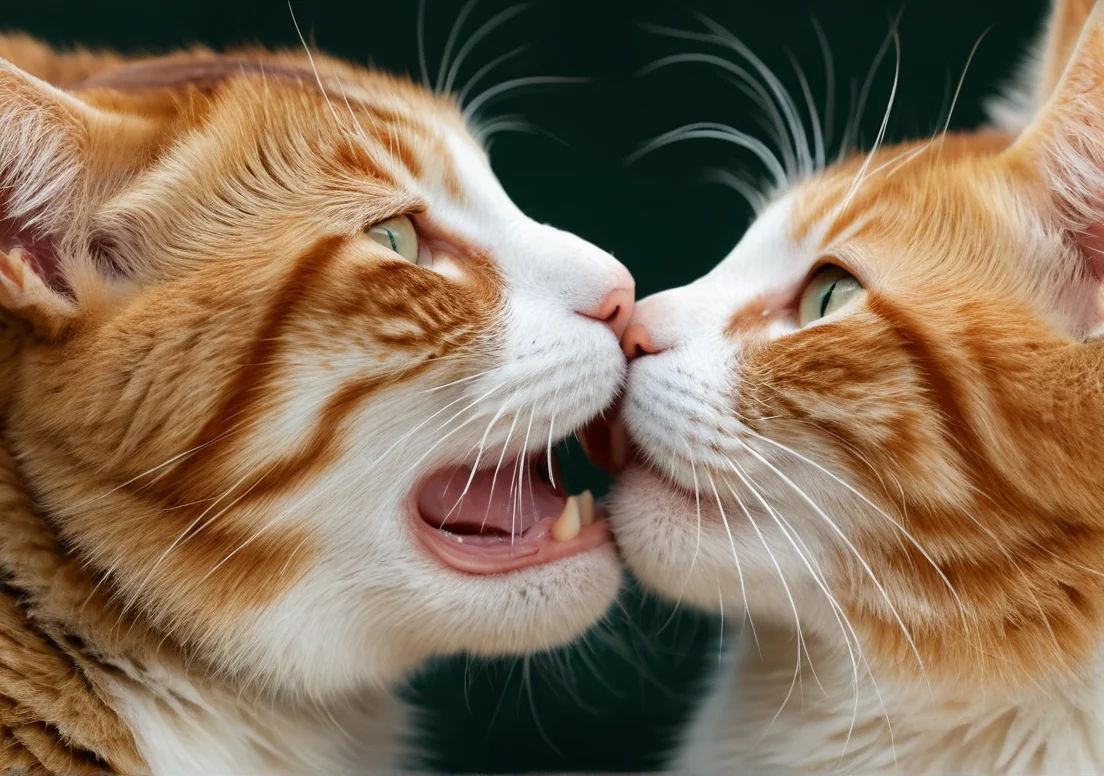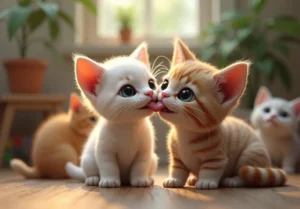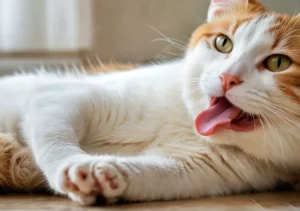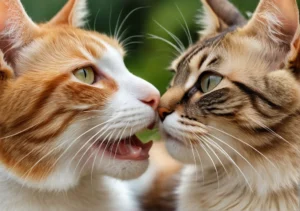There’s nothing quite like the unique bond between humans and their feline friends, especially when it comes to that delightful moment of scratching a cat’s back. Suddenly, your cat licks, purring in bliss. What drives this behavior?
Cats lick when you scratch their back as a form of reciprocal grooming and a sign of affection. This behavior stems from their instinctual past when they would groom each other for social bonding and hygiene. But wait—there’s more to this intriguing ritual than meets the eye. Keep reading to uncover the fascinating layers behind this feline phenomenon.

Why Do Cats Lick You Back?
Cats have a rich tapestry of instinctual behaviors, and licking when you scratch their back is one of those endearing quirks. Essentially, this behavior stems from their natural instincts and social interactions. When a cat licks you back, it mimics the grooming behavior they would exhibit with other cats. In the wild, cats groom each other as a way to strengthen social bonds and establish trust.
Moreover, this licking can also be a sign of relaxation and comfort. If your cat is content during a scratch, you’ll likely see it return the favor with some affectionate grooming. This reciprocal grooming fosters a sense of community and affection in their feline world, and when they do it with you, it’s a clear indicator that they regard you as part of their circle.
An interesting aspect? Cats have scent glands located in their tongues, meaning that through licking, they’re marking you with their unique scent, essentially saying, “You’re mine.” This behavior is deeply ingrained in their social structure, revealing the complex layers of their interaction with both humans and fellow felines.
Is Licking a Sign of Affection?
Licking can indeed signal a cozy bond between you and your cat. Your kitty’s little tongue action serves as more than just a quirky response; it’s a heartfelt expression of affection. When your cat licks you, it’s like giving you a big fuzzy hug wrapped in a warm purr.
Cats use their tongues not only for grooming but also to show care. Here are a few ways licking signifies your cat’s love:
- Trust – By licking you, your cat shows that it feels safe with you.
- Nurturing Instinct – It’s a way for them to express their instinct to care for their family members.
- Social Cohesion – It strengthens the emotional bond in a way that humans cue in on.
Additionally, if your cat licks you during play or as an answer to cuddles, it’s especially clear that they view you as a friend. This behavior also shows a blend of excitement and affection, integrating their playful spirit with their loving nature. Understanding these layers can help deepen your connection and ensure that both you and your feline companion enjoy a healthy, loving relationship.
What Does It Mean If They Lick Excessively?
Excessive licking is a behavior you might witness when your cat’s chilled out on your lap, especially after a good scratch on their back. It’s usually their way of showing affection and comfort, but if they’re doing it a lot, it may signal stress or health concerns.
Think about the context—are they licking more than usual? In that case, it could be a sign of anxiety, boredom, or even inflammation. Cats are masters at masking discomfort; they might lick as a coping mechanism. Also, look for other signs like hair loss or raw patches on their skin, which could indicate dermatitis or allergies. If you notice these symptoms along with excessive licking, it’s wise to have a chat with your vet. They can help determine if it’s just a quirky behavior or something more serious.
How Does Their Mouth Impact This Behavior?
The structure of a cat’s tongue plays a fascinating role in the licking game. Their tongues are covered in tiny, hook-like structures called papillae. These not only make their tongues feel rough but also help in grooming efficiently, as they remove dirt and loose fur quite effectively.
When you scratch a cat’s back, that’s like sending them into a mini spa session. The scratching stimulates them, and their instinct kicks in to groom themselves as a way of reinforcing their relaxed state. It’s somewhat akin to when humans stretch after a great massage—it’s soothing! Additionally, this action of licking may also be a way for them to bond with you. By licking, they’re transferring their scent onto you, marking you as safe and part of their territory. It’s a subtle yet powerful expression of trust and connection.
Do All Cats Exhibit This Behavior?
Not every cat is a licker, but you’ll find that many do lick when you scratch their back. This behavior isn’t limited to specific breeds; it’s more about the individual cat’s personality and past experiences. Cats often lick as a form of social grooming—it’s their way of showing affection and bond with you.
However, some breeds, like the Siamese or Bengal, might be more prone to this due to their playful and social nature. Still, even within a breed, a cat’s temperament and past interactions with humans can influence whether they’ll lick or not. If a kitty hasn’t been socialized much or is feeling anxious, they might not engage in licking.
This licking behavior can also vary with the cat’s mood—many kitties will lick when they’re feeling relaxed and secure during a good scratch. So, while licking may not be universal, it’s a common and delightful sign of a cat’s affection toward you.
What Role Does Social Hierarchy Play?
Grooming behaviors, including licking, can reveal fascinating insights about a cat’s social structure. In a multi-cat household, the dynamics of grooming are often influenced by a cat’s place in the social hierarchy. Dominant cats usually groom themselves and each other as a display of their standing, while submissive cats may lick their dominant companions as a sign of respect or appeasement.
This is significant because it sets the tone for how cats interact with their humans too. When you scratch your cat’s back and they respond with licking, it can mean they’ve accepted you as part of their social group. The licking can be a blend of affection and acknowledgment of your role within their hierarchy. Engaging in mutual grooming, where a cat licks you back, indicates a harmonious relationship—you’re seen as part of their family.
If you want to strengthen this bond, consider providing consistent affection through gentle scratches and observing your cat’s responses. This can help you understand their unique social cues and enhance your connection with them, keeping that loving dynamic alive.
Are There Any Health Benefits?
Grooming behavior, including licking, serves as more than just a way for your cat to feel good; it has tangible health benefits for both the feline and their human companions. When you scratch your cat’s back and they reciprocate by licking, it signals a bond. This exchange can reinforce a sense of comfort and safety.
For cats , grooming helps in several ways:
- Promotes circulation: The act of licking stimulates blood flow, which can encourage overall health.
- Stress relief: Grooming can reduce anxiety, as the repetitive motion is soothing and helps relieve tension.
- Fur maintenance: It assists in removing loose hair and skin debris, which can help minimize hairballs.
- Bonding: Licking can signify affection, reminding them of how they groom one another in a safe environment.
For humans , petting and scratching your cat can lower stress hormones like cortisol and release oxytocin, the bonding hormone. This makes the experience enjoyable and beneficial for you, too. So, that delightful moment when they lick can actually boost both your spirits.
What Recent Studies Say About Feline Behavior
Current research on feline behavior reveals fascinating insights into why your cat licks after you scratch their back. A study published in the journal Animals explored the social aspects of grooming in cats and highlighted how this behavior fosters social bonds. Cats often engage in mutual grooming as a way to strengthen their connections with each other.
By licking you in return, your cat might be expressing affection and trust, indicating that they view you as part of their social group. Additionally, it’s been noted that cats are more prone to lick when they’re in comfortable settings—like when they’re being scratched—pointing to the importance of environmental comfort in triggering these affectionate gestures.
Another interesting angle from recent behavioral studies suggests that cats lick due to a combination of instinctual behaviors and learned reactions. Kittens learn grooming from their mothers, and these habits stick with them into adulthood. So, when your cat licks you, it could be a learned response, intertwining instinct and habit, signaling their comfort and appreciation. Understanding this behavior not only enhances your bond but also provides insight into your cat’s personality and needs.
Fun Facts About Cats and Licking
Cats have a quirky way of expressing their feelings, and licking is at the heart of it all. When you scratch your cat’s back and they start to lick, it’s not just a random action; it’s a complex behavior tied to their instincts and social interactions.
Licking as Affection : Cats often lick themselves or others as a form of bonding. If they lick you while you’re giving them a nice scratch, it’s likely a sign of trust and affection. They see you as part of their family.
Grooming Rituals : Cats are natural groomers. Their tongues, covered in tiny, hook-like structures called papillae, are perfect for cleaning fur and removing loose hair. So, when they’re feeling relaxed and you hit that sweet spot on their back, they might instinctively go for a lick as part of their grooming routine.
Scent Marking : Cats have scent glands in their faces and on their bodies. By licking and rubbing against you, they’re marking you as theirs. It’s a way to share their scent and create a stronger bond.
Stress Relief : Just like humans might fidget or bite their nails when anxious, a cat licking can also serve as a calming mechanism. If they’re feeling a bit overwhelmed, the act of licking can help them self-soothe.
Social Behavior Among Kittens : Kittens lick each other as a form of social interaction. Adult cats often retain this behavior from their kitten days, where they’re taught bonding and grooming skills. When you scratch your cat’s back and they start licking, it may echo those early social lessons.
So, the next time your furry friend licks your hand or arm while you’re scratching that back, remember—it’s their way of saying “I trust you, and we’re in this together.”
Alex, a passionate animal lover, has experience in training and understanding animal behavior. As a proud pet parent to two dogs and three cats, he founded AnimalReport.net to share insights from animal experts and expand his knowledge of the animal kingdom.




